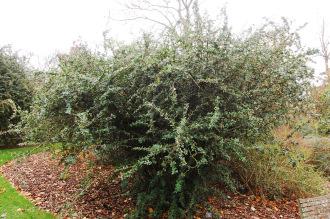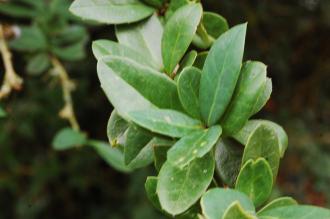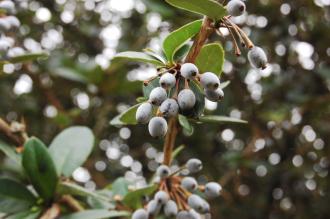
Berberis pruinosa (07/12/2015, Kew Gardens, London)
Position: Full Sun to partial shade
Flowering period: Late spring
Soil: Moist, well drained
Eventual Height: 2m
Eventual Spread: 2m
Hardiness: 7b, 8a, 8b, 9a, 9b, 10a
Family: Berberidaceae
Berberis pruinosa is an evergreen shrub with a bushy habit. Its mid green glossy leaves are elliptic to ovate with entire mildly spiny margins, up to 6cm long and 2.5cm across. Its branches contain spines along their length. Its yellow flowers are up to 8mm across and are produced in clusters along the length of its branches. Its purple fruit have a white waxy bloom, are ellipsoid berries and up to 7mm long.

Berberis pruinosa Leaf (07/12/2015, Kew Gardens, London)
Berberis pruinosa, commonly known as Barberry, is native to south China. In its native habit it grows in thickets and forest margins
The etymological root of the binomial name for Berberis is derived from the Arabic برباريس, the Arabic name for Berberis. Pruinosa is derived from the Latin pruinosus meaning ‘frosty’, in reference to its fruit.
When available the landscape architect may find Berberis pruinosa useful as an attractive evergreen spring flowering shrub whith interesting winter beries. It may be used as an effective impenetrable informal hedge.

Berberis pruinosa Fruit (07/12/2015, Kew Gardens, London)
Ecologically, Berberis pruinosa flowers are attractive to pollinating insects. The fruit are attractive to birds and some mammals. This shrub also provides good sheltering habitat for birds.
Berberis pruinosa prefers moist, fertile, well-drained soils. It tolerates most pH of soil.
Berberis pruinosa requires little maintenance. Necessary pruning should be carried out after flowering.

Landscape Architecture

